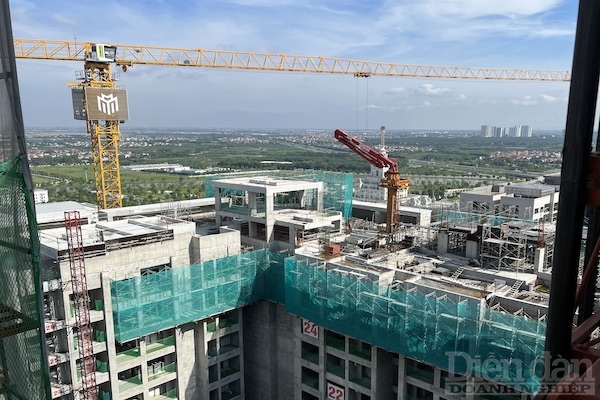Proposal to expand the scope of the 120 trillion VND credit package
According to Mr. Le Hoang Chau, Chairman of HoREA, guidance on credit procedures for suitable projects in need of funding for both investors and homebuyers under the 120 trillion VND loan program is critical.
The Prime Minister asked the State Bank of Vietnam in Official Letter 993/C-TTg to "direct commercial banks to continue promoting loans for the real estate sector, providing solutions for real estate projects and homebuyers to access credit more favorably, with special credit incentives for feasible real estate projects that progress quickly, stimulating growth, and boosting the real estate market."

Clearing legal obstacles
The first approach to "continue promoting credit for the real estate sector" is a "non-credit solution," which is dependant on competent authorities at both the central and local levels overcoming "legal obstacles" to real estate projects as soon as possible. This guarantees that projects fulfill credit standards (real estate projects with adequate legal standing to serve as security for financing) and makes project execution easier for investors.
According to HoREA, in order to implement the "non-credit solution" and remove "legal obstacles" for real estate projects, it is critical to strengthen the "role and responsibility of the Head of the Prime Minister's Working Group" of the Ministry of Construction, in accordance with the Prime Minister's guidance in Section 2 of Official Letter 993/C-TTg, and by leveraging the role of the Government's Working Group.
Commercial banks should accelerate the execution of the 120 trillion VND credit program for preferential financing to social housing development, worker housing, and the rehabilitation of aging apartment complexes. Furthermore, it is proposed that the beneficiaries of the 120 trillion VND loan package be expanded to include developers and purchasers in commercial housing projects with costs not exceeding 3 billion VND/unit, with preference given to "first-time homebuyers."
HoREA also suggests that the Ministry of Construction continue to work with the State Bank of Vietnam, the Ministry of Planning and Investment, and the Ministry of Finance to establish a preferential credit package of 110 trillion VND for social housing, as envisioned in the upcoming Law on Housing, which is expected to be passed during the National Assembly's 6th session. This aims to meet the objective of creating at least 1 million social housing units between 2021 and 2030.
Handling property-secured debts
HoREA particularly recommends revising and supplementing the proposed Credit Institutions Law to require credit institutions to structure credit approval in line with the idea of dividing duties between the appraisal and credit approval phases.
Credit approval via electronic methods should adhere to State Bank standards. Customers should agree with the lending institution to employ an independent consulting unit to examine the viability and cash flow of the investment project; the cost of this evaluation is borne by the customer.
Furthermore, it is proposed to allow the buyer of a debt originating from a credit institution's bad debt, a branch of a foreign bank, whose collateral is the right to use land, assets attached to the land, or assets formed in the future, to mortgage, register the mortgage of the right to use land, assets attached to the land, or assets formed in the future as collateral for the purchased debt. The transfer of the project, or a portion of the real estate project, as collateral for that loan must be done in line with real estate business rules.

To ensure consistency and uniformity, HoREA proposes amending and supplementing Clause 3, Article 39 of the draft Law on Real Estate Business to allow developers to transfer projects that have received land allocation decisions, land lease decisions for state-managed projects, and have fulfilled financial obligations for the land (including land use fees, land lease fees, taxes, and fees related to land, if any) to the state for the project or the transferred part of the project.
If the developer has not fulfilled all financial commitments for the project's land or the transferred portion with the state, the transferee must fulfill any financial obligations that the transferor has not fulfilled. The transferee has placed the guarantee at the State Treasury or been guaranteed by a bank to assure the accomplishment of all financial obligations for the land of the project or the transferred part that have been set by the appropriate state body. The transfer contract should include these documents.








